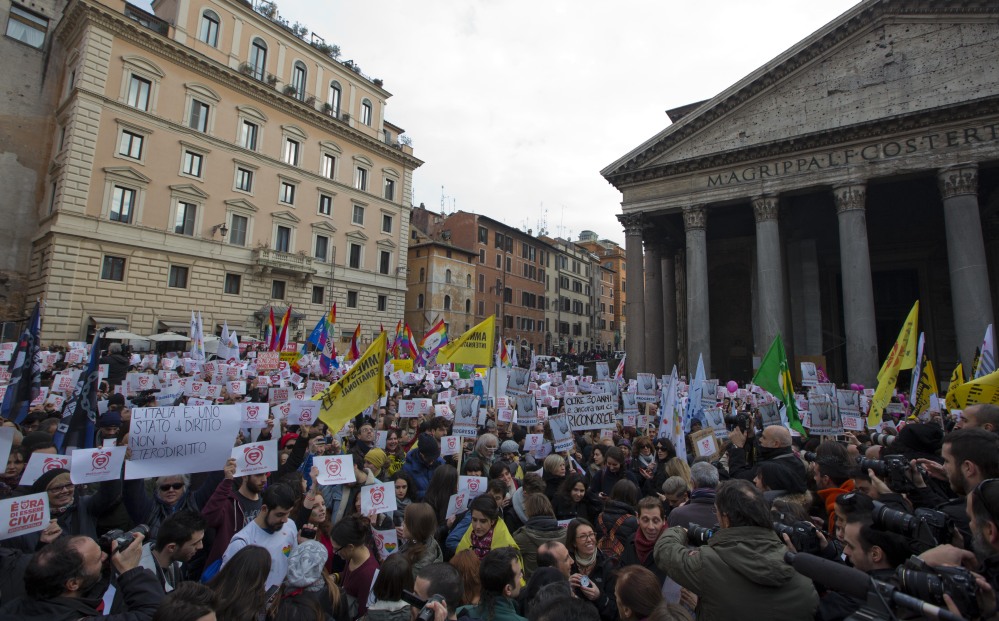The last time Italy tried to grant legal rights to same-sex couples, Pope Benedict XV helped lead the charge that stopped it. But as Italian lawmakers open debate Thursday on a new civil unions bill, the Vatican under Pope Francis is taking a very different approach.
Passage of the legislation in the nation of 60 million would mark a milestone in the gay rights movement. Italy is the last country in Western Europe – other than Vatican City – to offer same-sex couples no legal rights, a position based on the Roman Catholic Church’s historic opposition to such unions.
As Italy now undertakes its most serious effort yet to legalize civil unions, the more nuanced response of the Vatican in its own back yard is turning the bill into a test case for whether Francis’s inclusive tone can translate to change on the ground. Some gay activists are hoping that the Vatican’s light touch in Italy could help similar bills in other predominantly Catholic countries including the Philippines and in Central America where same-sex couples have no legal rights.
“My impression is that the pope is determined not to be confrontational and fight this law,” said Massimo Franco, a Vatican watcher and columnist for Italy’s Corriere della Sera.
In Italy, the Catholic reaction to the measure has been split. Hundred of thousands of Italians – including Catholics – demonstrated last weekend in an unprecedented display of support for the bill. At the same time, the opposition – led by conservative Catholic groups – plans to stage a “Family Day” protest on Saturday aimed at stopping the legislation.
Italian bishops and cardinals have largely sided with the opposition, rallying religious conservatives against it. Yet unlike the last debate on civil unions, in 2007, the powerful Italian bishops’ conference is not directly sponsoring the protest scheduled for Saturday. More important, the Vatican under Francis has taken a largely hands-off approach.
The Italian news media took note when Francis abruptly canceled a meeting with Cardinal Angelo Bagnasco of Genoa, the president of the Italian bishops conference, after he publicly backed the Family Day protest. Meanwhile, Bishop Nunzio Galantino – whom Francis appointed as secretary general of the Italian conference – offered a highly nuanced and somewhat novel position.
In an interview with Corriere della Sera, he reiterated the Catholic teaching that marriage is between only a man and a woman, and he said he strongly opposes adoption rights for same-sex couples. But he also seemed to recognize society’s obligation to recognize the “growing presence of unions of a different kind.”
“The state has a duty to give answers to everyone, respecting the common good first,” Galantino said.
A pope highly skilled at leaving his words open to interpretation, Francis has been hard to read – a fact that some say is telling. Last week, Francis said the combative synod of the church hierarchy clarified in October that, for the church, “there cannot be any confusion between the family willed by God and other kinds of unions.”
Conservatives considered his words an endorsement of the opposition, while liberals took them to mean that the church does not view civil unions as marriage, making them potentially acceptable. Other observers noted that Francis – who was speaking to a group of Vatican judges who rule on annulments – was not actually opining on the Italian debate at all.
One thing is certain. Francis’s approach differs radically from that of Benedict, his predecessor, who helped thwart a 2007 measure on civil unions in Italy. Back then, the Vatican aggressively lobbied Italian officials to stop the bill even as Benedict called for “the Church and every public institution” to defend the traditional family with “political initiatives.”
Copy the Story LinkSend questions/comments to the editors.



Success. Please wait for the page to reload. If the page does not reload within 5 seconds, please refresh the page.
Enter your email and password to access comments.
Hi, to comment on stories you must . This profile is in addition to your subscription and website login.
Already have a commenting profile? .
Invalid username/password.
Please check your email to confirm and complete your registration.
Only subscribers are eligible to post comments. Please subscribe or login first for digital access. Here’s why.
Use the form below to reset your password. When you've submitted your account email, we will send an email with a reset code.